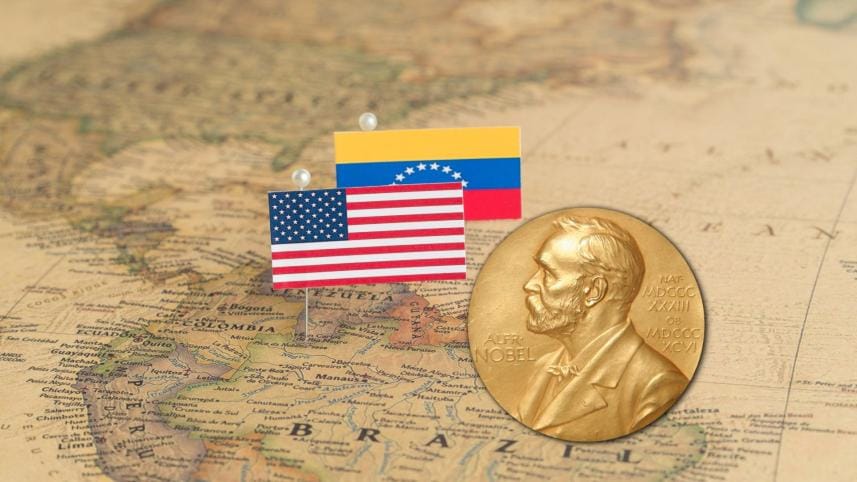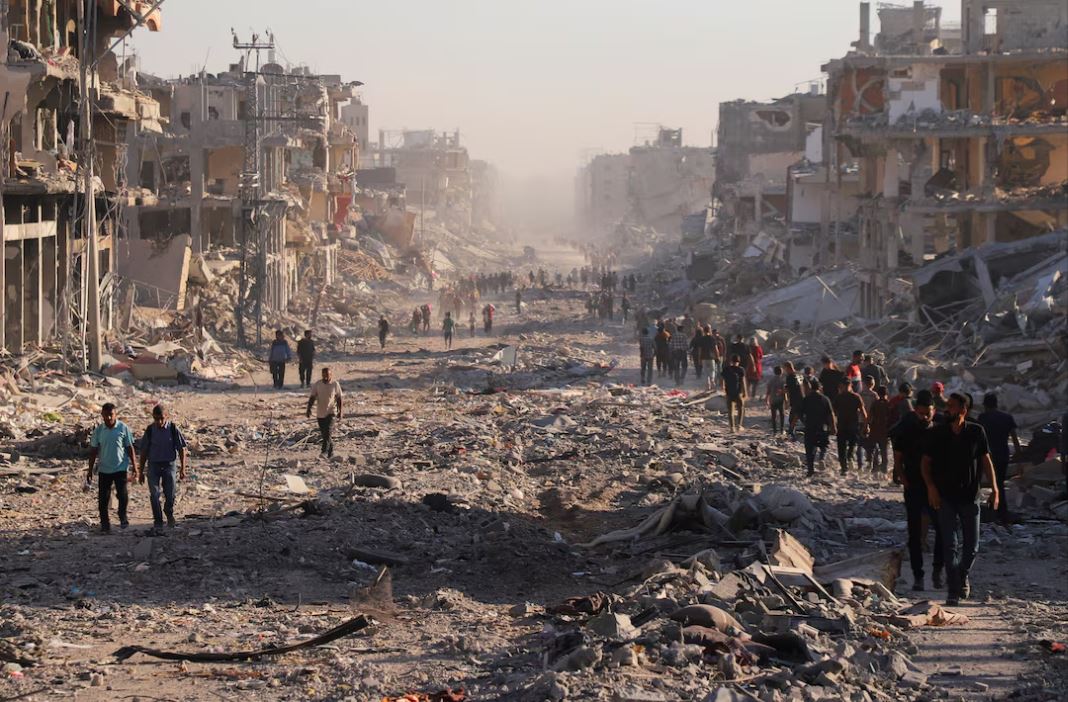Machado's Nobel Prize puts Venezuela and US policy in the spotlight

When Venezuelan opposition leader María Corina Machado won the 2025 Nobel Peace Prize, the announcement rippled far beyond the usual celebration of moral courage. To many, it wasn't just about honouring her defiance against an authoritarian regime—it was also a symbolic pushback against a government the West has long criticised. And just like that, Washington's long and uneasy engagement with Venezuela gained a new, moral dimension: human rights. Interestingly, Machado dedicated her Nobel to US President Donald Trump, praising his "decisive support" for Venezuela's pro-democracy cause. She said Trump and the US remain key allies as her nation stands on the brink of victory in its struggle for freedom. President Trump later shared that Machado had personally called to dedicate her Nobel Peace Prize to him, saying she believed he "really deserved it." Describing her as "very nice," Trump mentioned his continued efforts to support Venezuela, calling the nation's condition a "basic disaster."
The UN Human Rights Office said the award mirrored "the clear aspirations of the people of Venezuela for free and fair elections, for civil and political rights and for the rule of law." European leaders went further. Ursula von der Leyen, head of the European Commission, praised Machado's "courage" and declared that her prize spoke for "every voice that refuses to be silenced." Germany's government chimed in, calling it a recognition of her "longstanding commitment to democracy and human rights." The message was unmistakable—this year's Nobel was not just about one woman. It was a statement about Venezuela's political decay, and perhaps a quiet challenge to the US to redefine its own role there.
Machado's story is one of defiance laced with tragedy. After winning the opposition's primary in 2023, she was banned from public office and forced into hiding. Her rallies had drawn massive crowds, her economic plans—focused on privatisation and welfare reform—divided the public, and her calls for democracy drew fury from President Nicolás Maduro's government. Arrested briefly and repeatedly harassed, she became both a symbol and a target. Most of her close advisers have either been jailed or fled the country. Still, her message hasn't softened. She has accused the Maduro regime of running a "criminal mafia" and turning Venezuela's institutions into hollow shells.
But the Nobel Peace Prize changes the dynamics. It introduces a new layer to the US-Venezuela relationship. Earlier this year, when US warships appeared off the Venezuelan coast under the banner of a "counter-narcotics" mission, the move reignited old tensions. Washington said it was targeting drug cartels; Caracas called it provocation. The situation, as always, lived in the grey: part strategy, part messaging, part performance.
The US has long portrayed Venezuela as a "narco-state." Yet analysts have long questioned the accuracy of that framing. Yes, Venezuela's geography makes it a transit point—its border with Colombia and its Caribbean access make trafficking easier. But even US intelligence reports admit that the bulk of cocaine entering America still moves through Central America and Mexico, not Venezuelan shores.
So, if Venezuela isn't the main artery of the global drug trade, why the military pressure? Why now?
Perhaps the Nobel offers a clue.
Through the lens of The Open Veins of Latin America by Eduardo Galeano, Latin America's recurring crises often stem from external powers acting under moral pretexts—liberation, anti-corruption, or democracy-building—only to pursue their own interests. Peter H. Smith's Talons of the Eagle dissects how Washington's rhetoric of freedom often aligns neatly with its geopolitical goals. Daniel M. Goldstein's The Politics of Interventionism in Latin America goes further, arguing that even "humanitarian" missions tend to fracture the very institutions they claim to protect. Read together, these works suggest that the US's moral turn in Venezuela—now under the banner of human rights—may be less about altruism and more about strategic repositioning in a region slipping from its influence.
Inside Venezuela, the picture remains grim. Sanctions have devastated the economy. Inflation continues to shred savings. Millions have fled. Hospitals run short of medicine; power cuts are routine. For ordinary Venezuelans, these grand geopolitical narratives—whether told from Washington or Caracas—mean little. Their fight isn't about ideology or sovereignty; it's about finding bread, fuel, or a working bus.
Maduro, meanwhile, has perfected the language of resistance. Each US move strengthens his narrative of a besieged homeland. "We are prepared, but not for war," he declared in January, accusing Washington of trying to provoke conflict. He appeals for dialogue, but always with a hint of defiance. And when the Nobel Prize was announced, his government dismissed it as Western propaganda.
It's a script both sides know well. The more Washington pressures Caracas, the stronger Maduro's nationalist posture becomes. The more authoritarian he appears, the easier it is for Washington to justify pressure in the name of freedom. Both feed off each other's hostility.
This loop has gone on for decades. From Hugo Chávez's defiant oil diplomacy to Maduro's survival through economic collapse, Venezuela has been a mirror for US anxieties about its waning influence in Latin America. The drug war gave one excuse, democracy another. Now, the Nobel Prize offers a new moral anchor—human rights.
And yet, Washington is stuck. Sanctions haven't toppled Maduro. The 2019 Guaidó experiment failed. Direct military action would be politically toxic and militarily chaotic. Venezuela's terrain is unpredictable, its armed groups fragmented, its loyalties uncertain. Even "limited" strikes could spiral into a regional mess.
So, for now, the US operates in a grey zone. With Machado's Nobel win, Washington finds itself under renewed pressure to act, but every move carries a cost. Support her too openly, and it fuels Maduro's claims of foreign meddling. Stay silent, and it betrays the image of moral leadership the Nobel has suddenly revived.
Caught in between are Venezuelans who have run out of patience. Their country, once among the richest in Latin America, now limps along on crumbling infrastructure and fading hope. They want stability, not slogans. That's the irony at the heart of this story. The Nobel Prize might be intended as a beacon of hope, but it also risks becoming another piece in a geopolitical chess game.
Syed Raiyan Amir is senior research associate at The KRF Center for Bangladesh and Global Affairs (CBGA). He can be reached at raiyancbga@gmail.com.
Views expressed in this article are the author's own.
Follow The Daily Star Opinion on Facebook for the latest opinions, commentaries and analyses by experts and professionals. To contribute your article or letter to The Daily Star Opinion, see our guidelines for submission.




 For all latest news, follow The Daily Star's Google News channel.
For all latest news, follow The Daily Star's Google News channel. 

Comments